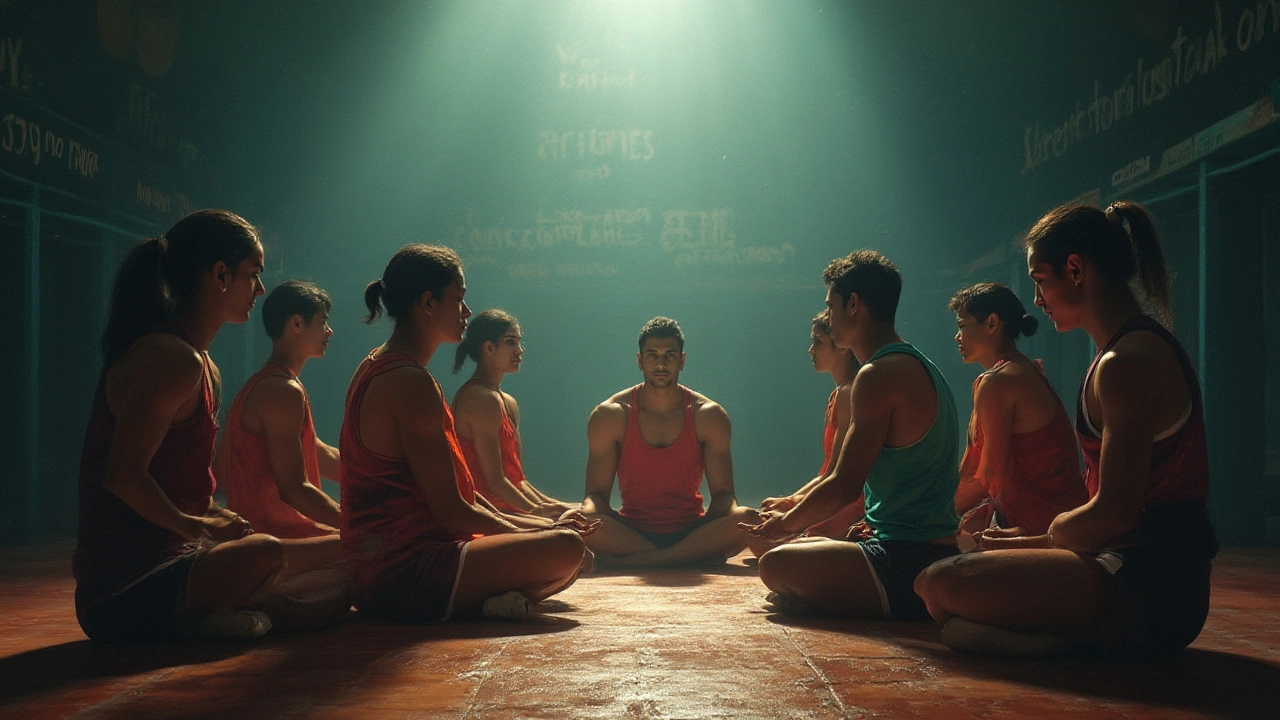Imagine yourself standing at the crucial moment: match point at Wimbledon, penalty shot in the World Cup, dangling off a cliff edge in the Himalayas, or squinting down the finishing line of an Ironman. Sweat pours, hands tremble, heartbeat roars. The crowd makes it worse. But what freezes you isn’t your body giving up—it’s your mind. There’s a surprising truth lurking behind every jaw-dropping athletic feat: the brain, not the biceps, is often the real battleground. Which sport pushes the human mind to the brink? It’s not just a pub debate. Sports psychologists, coaches, and the world’s toughest athletes have picked sides—and the answers may surprise you.
The Truth About Mental Toughness in Sports
When we talk about the hardest sport mentally, everyone jumps to their favorite: “It’s boxing because one mistake means lights out!” or “It’s golf, the pressure never stops!” But here’s the thing: every sport plays a different mind game. Imagine being a Formula 1 driver—one slip at 200mph, and it's not just the race at risk. Or, picture a chess grandmaster sweating over a single move for hours under blinding TV lights. Both sports demand sharp focus, nerves of steel, and the ability to block out crowd noise, self-doubt, and relentless pressure. Mental toughness is the glue holding everything together when physical limits are pushed.
What does ‘mentally tough’ even mean? Psychologists define it as grit, resilience, and the power to stay laser-focused, regardless of pain, fatigue, or setbacks. Some studies (for example, Prof. Peter Clough from Manchester Metropolitan University) break it down as confidence, motivation, control, and commitment. Each sport requires a cocktail of these traits, but the proportions are wildly different. Athletes build muscle memory over years of training, but their "mental muscle" takes just as long—sometimes longer—to shape. For some, the battle is short and sharp; for others, it’s a slow burn over hours or even days.
Inside the Mind of Elite Athletes: Focus, Fear, and the Art of Recovery
Serena Williams, Michael Phelps, and Usain Bolt—the world’s most decorated athletes—credit their success not just to training but to the mental grind. Serena has spoken about visualizing herself winning points before matches, training her mind to shrug off mistakes. Phelps worked with a sports psychologist in his teens, practicing meditation and even rehearsing disaster scenarios, so nothing could catch him off guard. Athletes at the top know that panic, self-doubt, or a flicker of distraction can topple years of hard work in seconds.
Let’s dig into what happens when the mind is pushed to its edge. You’re a gymnast—one slip could lead to serious injury. You need perfect focus for a flawless performance. Or, take marathon runners: hours on the road, nowhere to hide, alone with their thoughts. The real foe is the endless whisper that says “you can’t do this.” Enduring pain or distraction, blocking out the “noise” from the mind and the world, that’s the real test. Sports like ultra-endurance races—think 200-mile runs in Death Valley—are infamous for breaking even the fittest minds. Athletes talk about hallucinations, emotional breakdowns, and only those who command their thoughts survive.
Each discipline has its own curveball. Team sports pile on different mental demands: you can't just focus on yourself. Footballers feel the weight of their teammates, coaches, and entire fanbase. One missed penalty, and you’re the villain. Think about cricket: batters waiting hours, then stepping out needing to stay calm amid deafening noise or eerie silence. Then there’s the toll of recovery—getting over public failure, constant comparison, and jumping back into the ring after a crushing loss.

The Sports Widely Regarded as the Hardest Mentally
You might expect a straight answer, but the “hardest sport mentally” changes depending on who you ask. Still, researchers and experts often agree on a shortlist. Here’s how some of the most infamous sports stack up:
- Boxing: The stakes are brutally simple. Boxers have just seconds to adapt, manage fear, and stop themselves from crumbling after a crushing hit. Losing focus can mean serious injury.
- Golf: A game that tests patience. Golfers face hours of slow, solitary play, haunted by their last shot. Cracking under pressure is all too common, especially during high-stakes putts.
- Gymnastics: Requires absolute focus—one moment of doubt means disaster. The fear of injury can haunt athletes, and most start training almost as toddlers. The margin for error? Barely a heartbeat.
- Ultra-endurance sports (Ironman, Ultramarathon, Cycling Grand Tours): These push athletes to keep moving beyond pain, exhaustion, or boredom. The mental grind is relentless—quitting always whispers as an easy out.
- Football (Soccer): Players juggle tactical thinking, crowd pressure, and the emotional rollercoaster of matches. Missed penalties and own-goals linger for years (just ask Stuart Pearce, who finally broke his curse in 1996 after missing a crucial penalty in 1990).
- Tennis: A lonely sport. Tennis players wrestle momentum swings, silence between points, and the fear of "choking" in tie-breakers. Andre Agassi once revealed in his autobiography how the mind games on court sometimes felt endless.
- Free Solo Climbing: A mistake means certain death. The mind must silence every distraction—no safety net, no second chance. Alex Honnold, famous for climbing El Capitan without ropes, talks about training his brain as much as his grip strength.
Of course, plenty of other sports make their case. Rugby: carrying on after bone-crunching hits. Chess: six-hour marathons against relentless logic. Sports shooting: where a split-second wobble destroys years of prep. But in every top-level discipline, the battle for mental control is the heart of the matter.
Secrets of Building Mental Toughness: Lessons from Pros
Is mental strength a gift, or can you build it yourself? Nearly every elite athlete says it’s both. Genetics may shape your baseline, but daily habits and training routines turn mental "noodles" into steel cables. Sports psychologists suggest a simple formula: face your fears, learn to fail gracefully, and practice deep focus. Instead of seeing mistakes as disasters, pros treat them as feedback. Michael Jordan missed over 9,000 shots and lost nearly 300 games. He says each failure toughened his mind more than any trophy.
It’s not just about gritting your teeth through pain. Visualization is huge—imagine yourself nailing that goal or sticking the landing before you attempt it. Navy SEALs use this trick in training. Instead of dwelling on fear, they map out what success looks like, down to the finest detail. Mindfulness and meditation are now standard in top football clubs and American football teams, as they teach players to tune out distractions and control emotions. Journaling mistakes, recording personal victories, and reviewing performances are tiny daily habits that, over months, make fear feel familiar, not paralyzing.
Sleep, nutrition, and even social support can boost your mental edge. A tired mind folds fast. Serena Williams protects her sleep schedule like a prize. Cyclists swap tips for meditation apps, while F1 stars spend hours with coaches drilling “what if” scenarios. There’s even mental rehearsal for adversity: rehearsing how to handle failures, cheating, injuries, or angry fans. Each strategy is one more tool in the psychological toolkit, building a buffer against breakdowns when real pressure strikes.
If you want to boost your mental game, steal a few actual pro tricks:
- Break big tasks into bite-sized goals—don’t climb Everest in a day. Win the next point, not the match.
- Learn controlled breathing. It’s basic, but it works. Slow exhalations calm the mind, steady the nerves.
- Embrace healthy routines. Good sleep, decent food, and downtime with mates can work wonders.
- Avoid perfection traps. See mistakes as experiments, not failures. Analyze, tweak, and move forward.
- Visualize positive outcomes. Picture success before you chase it—your brain responds to rehearsal.

Why the Mental Game Matters More Than Ever
The world’s best athletes repeat it like a mantra—sports are won or lost in the six inches between your ears. Sure, physical power gets headlines, but today’s pressure is off the charts: money, social media, news scrutiny, and endless replays. Simone Biles, Naomi Osaka, and Ben Stokes have all spoken up in recent years about struggling with the mental strain of elite sport. The conversation has shifted: having a strong mind isn’t just a bonus. Without it, nothing else matters.
The pandemic tossed another spanner in the works: empty stadiums, abandoned routines, travel chaos. Suddenly, athletes had to build their own motivation in silence. Sports psychologists were flooded with requests. “I’ve never seen mental health treated as seriously in sport as now,” said Dr. Carla Meijen at St Mary’s University (London). Clubs, leagues, and sponsors are finally investing in brain training and open conversations about pressure, doubt, and burnout.
If you want to get ahead in sports—or pretty much any challenge—think like an athlete. Treat your mind as a muscle to work out, not a fixed limit. Build routines, enjoy setbacks, imagine victory in the quiet before the storm. Whether you’re running a marathon, playing five-a-side down the road, facing job interviews, or just trying to keep cool under stress, these tricks work. The hardest sport mentally? It might not even be on a field. It could be any test that drags your brain, heart, and nerve into the ring, day after day—seeing what breaks, and what holds steady.
